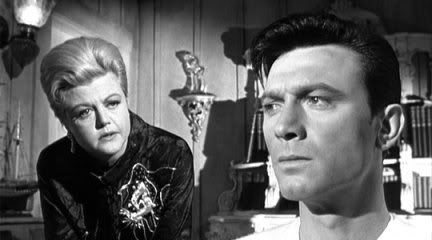They can make me do anything, Ben, can't they? Anything.

As this is the final night of the Democratic National Convention, when Barack Obama will be accepting his party's nomination for President of the United States, I saw fit to watch John Frankenheimer's 1962 political thriller The Manchurian Candidate, which likewise reaches its climax at a political convention during the presidential nominee's acceptance speech. Not that I expect the same outcome in Denver tonight, but I couldn't help making the connection. Besides, any excuse for me to revisit this classic American film is a good one.
The film starts in Korea in 1952, when Army major Frank Sinatra and less than lovable sergeant Laurence Harvey are ambushed along with the rest of their patrol, but somehow manage to escape their captors. Back home Harvey is awarded the medal of honor, but chafes under the attention of his domineering mother (Angela Lansbury, giving a career-defining performance) and buffoonish stepfather, a Red-baiting senator (James Gregory) being lined up for the vice presidency. Sinatra, meanwhile, has been transferred to Army intelligence, but keeps having the same disturbing dream about what really happened back in Korea. Seems the entire patrol was subject to conditioning by the Russians and Chinese for the purpose of turning Harvey into the perfect assassin and rather than saving them, well, let's say Harvey's actions were less than heroic.
I don't want to go into too much more detail because the joy in a film like The Manchurian Candidate is in the discovery of its secrets and the way its well-oiled machine of a plot is put together. I will say that it features one of the greatest meet-weirds in movie history, when Sinatra is approached by Janet Leigh, who has an extremely peculiar way of making conversation. The film also features Henry Silva as the patrol's Korean translator, who delivers them into enemy hands, Khigh Dhiegh (who played essentially the same role in Seconds) as the endlessly self-amused brainwasher, and an uncredited Whit Bissell as an Army medical officer who is slow to take Sinatra's misgivings seriously. It is also, without a doubt, Frankenheimer's masterpiece and a must-see for anybody who considers themselves a film buff.